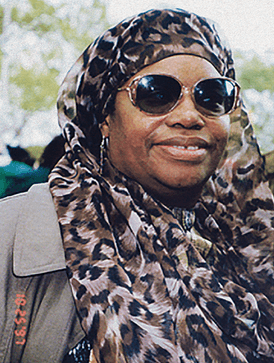Safiya Bukhari facts for kids
Quick facts for kids
Safiya Bukhari
|
|
|---|---|
 |
|
| Born |
Bernice Jones
1950 |
| Died | August 24, 2003 (aged 52–53) North Shore University Hospital, Queens, New York, U.S.
|
| Occupation | Political activist |
| Known for | Former member of the Black Panther Party |
Safiya Bukhari (born Bernice Jones; 1950 – August 24, 2003) was an American activist who worked for social justice. She was a member of the Black Panther Party, a group that worked for the rights of Black people. Safiya also helped start important groups like the Free Mumia Abu-Jamal Coalition (NYC) and the Jericho Movement. These groups worked to support political prisoners in the U.S. She was also a leader in the Republic of New Afrika.
Contents
Early Life and Activism
Safiya Bukhari was born in The Bronx, New York, in 1950. She grew up in a large family and planned to become a doctor. She studied at New York City Community College. While in college, she joined a sorority, which is a social club for students.
Discovering the Black Panther Party
Her interest in activism began during a sorority trip. She met a member of the Black Panther Party who was selling newspapers. This person invited Safiya and her friends to help with the Party's Free Breakfast for Children program. This program gave free meals to children in need.
Joining the Black Panther Party
Safiya and her friends started volunteering with the Free Breakfast program. She noticed that the police were spreading false rumors about the Panthers. They claimed the Panthers were poisoning the food. Safiya realized that the schools were not feeding the children, but they also didn't want the Panthers to help.
Becoming a Member
In 1969, Safiya saw a police officer bothering a Panther member who was selling papers. When she spoke up, she was arrested. These events made her decide to officially join the Black Panther Party. She worked at the Party's office in Harlem. She became in charge of information and communication for the East Coast Panthers.
Personal Changes and New Paths
Safiya had a daughter named Wonda Jones. In 1971, she converted to Islam. Later, she decided to go "underground" with the Black Liberation Army (BLA) to avoid testifying in court. The BLA was a group that also worked for Black liberation.
Time in Prison
On January 25, 1975, Safiya Bukhari was captured after an incident in Norfolk, Virginia. A fellow BLA member was hurt during this event. She faced serious charges related to the incident. Her legal process was very difficult. Her trial was very quick, and she wasn't allowed to be there for parts of it. She was sentenced to a long time in prison.
Life Inside Prison
Safiya was sent to the Virginia Correctional Center for Women. She was seen as a very strong-willed person by the prison. She had health issues and felt she wasn't getting proper medical care. On New Year's Eve 1976, she tried to leave the prison. She was caught two months later and returned to Virginia.
Helping Others from Inside
While in prison, Safiya and other inmates started a program called Mothers Inside Loving Kids (MILK). This program aimed to help mothers in prison stay connected with their children. Safiya also took legal action against the prison system. She said her treatment was unfair and against her rights. In August 1983, she was released from prison. She had rules about who she could be with after her release.
Later Life and Continued Activism
In 1984, Safiya Bukhari married Ashanti Alston. She worked as a social worker at the Legal Aid Society, helping people with legal issues.
Fighting for Political Prisoners
Safiya continued her activism after leaving prison. In 1992, she helped create the New York chapter of the Free Mumia Abu-Jamal Coalition. This group worked to free Mumia Abu-Jamal, who was a political prisoner. In 1998, she helped organize the Jericho March and Rally in Washington, D.C. This event brought attention to U.S. political prisoners. She described Jericho as a movement to make people recognize that political prisoners exist in the U.S.
Other Important Work
Safiya was also involved with the Malcolm X Grassroots Movement. She co-hosted a radio show called "Where We Live" on WBAI. The show focused on issues related to prisons. She was also the vice president of the Republic of New Afrika. This group worked to create a Black nation in parts of the Southern U.S.
Legacy
Safiya Bukhari passed away on August 24, 2003, from heart failure. After her death, Mumia Abu-Jamal said she was a "true revolutionary." He described her as patient, disciplined, and determined.
Her writings were published after she died. Her daughter, Wonda Jones, asked Laura Whitehorn to help collect and edit them. Her book, The War Before: The True Life Story of Becoming a Black Panther, Keeping the Faith in Prison and Fighting for Those Left Behind, was published in 2010 by The Feminist Press. It tells her amazing life story.
Images for kids
 | Jessica Watkins |
 | Robert Henry Lawrence Jr. |
 | Mae Jemison |
 | Sian Proctor |
 | Guion Bluford |


